
UTAR promotes industry-academia collaborations through virtual discussions
Following the success of the first international collaboration forum titled “COVID-19: Current and Future Trends of International Collaboration” held on 18 November 2020, UTAR Division of Community and International Networking (DCInterNET) organised another successful international collaboration forum titled “2021 UTAR Industry-Academic Dialogue: E-Commerce” on 7 April 2021 on ZOOM.
Aimed at promoting the industry-academia collaborations between UTAR and its collaboration partners, the virtual forum was also co-organised by UTAR Institute of Postgraduate Studies and Research, Centre for Corporate and Community Development and Department of Consultancy and Commercialisation; and supported by UTAR Faculty of Management and Accountancy (FAM), Faculty of Business and Finance (FBF), Faculty of Information and Communication Technology (FICT), Lee Kong Chian Faculty of Engineering and Science (LKC FES) and Unovate Centre.
Held for the second time in its series, the forum invited a total of five internal speakers from UTAR, namely FAM Department of Accountancy Lecturer Ezatul Emilia binti Muhammad Arif, FICT Department of Information Systems Senior Lecturer Ts Lim Jit Theam, FBF Department of Commerce and Accountancy Specialist I Chin Yoon Mei, Head of Unovate Centre-cum-FEGT Department of Electronic Engineering Lecturer Dr Lee Sheng Chyan and LKC FES Department of Internet Engineering and Computer Science Lecturer Dr Wong Whee Yen.
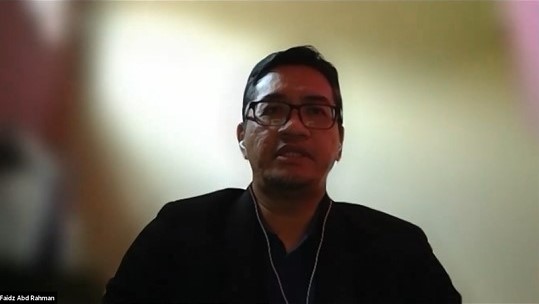
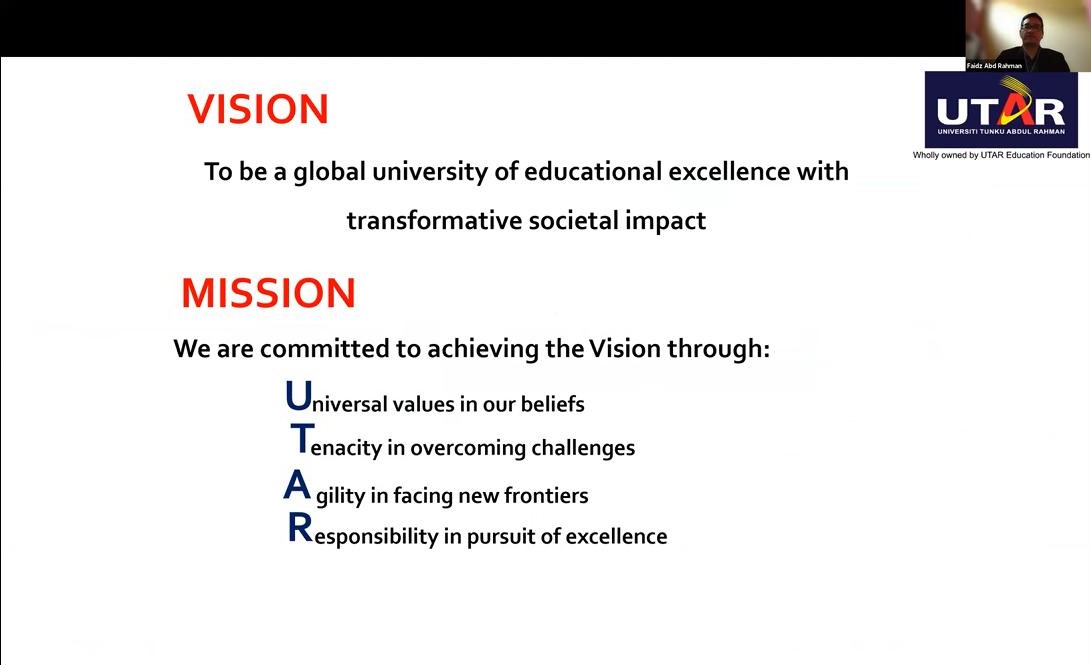
Prof Faidz introducing UTAR and its academia collaborations to the participants
The forum kick-started with opening remarks by UTAR Vice President for R&D and Commercialisation Prof Ts Dr Faidz Bin Abd Rahman. In his speech, Prof Faidz said, “Our participation today brings significance to the event as we dialogue on a common interest, and paves the way for establishing potential industry-academia collaborations. Special thanks also to the speakers of today, who are academics from various faculties to share with us their knowledge and experiences on e-commerce. They will be bringing to light its current and future trends, its ecosystem and the application of technology as solutions for improving e-commerce.”
He added, “In a time of the pandemic, e-commerce has further proven its importance and caused many businesses to re-evaluate their old ways of running their businesses. Those who were quick to adapt saw the need for change and realised that digitising their business was their best chance of survival. Soon enough, many businesses were expanding online and the addition of a pandemic has accelerated the shift from physical stores to digital or online shopping. This caused an e-commerce boom. One of the factors to thrive in the e-commerce industry is to have a good understanding of its strategies, challenges and benefits. Fortunately for us, the sharing from industry players today will also give us knowledge and information from their first-hand experience on the effects of digitisation and a pandemic towards their businesses. From the educational perspective, the networks established with the industry players through collaborations are important for us to continuously improve our syllabus and programmes. Apart from that, academia-industry collaboration also enables research and development consultancy, human capital development, talent development, and curriculum development. Truly, the benefits of academia-industry collaboration are vast and hope today’s dialogue will facilitate more collaborations. This is an important time for growth, change and adaptability, and one of the best ways to enable continuous learning is through collaborations with the industry players so we know about the latest happenings in the industry.”

Dr Pok (left) introducing the first speaker Ezatul who spoke on the current and future trends of e-commerce
The forum was moderated by UTAR Faculty of Accountancy and Management Deputy Dean for R&D and Postgraduate Programmes Dr Pok Wei Fong. The forum was then followed by its ball rolling session by Ezatul with the title “Let’s start the E-commerce: Current and Future Trend and Government Support. In her talk, she primarily discussed topics such as the current issues, future trends and the available government supports for businesses that focus on digitalisation in Malaysia. She explained, “Malaysia’s e-commerce market is quickly becoming one of the largest in Southeast Asia. Its growth is outpacing that of traditional established markets in the region. This was apparent even before the impacts of the pandemic. This growth in e-commerce has been coupled with the growing consumer preference for online shopping and availability of customised payment options in recent years.” She further explained that Malaysia recorded 28% in the retail market and it is also one of the leading economies in ASEAN in terms of its e-commerce contribution to GDP. She also emphasised that government initiatives and supports are among the boost for Malaysia to leverage e-commerce’s growth.
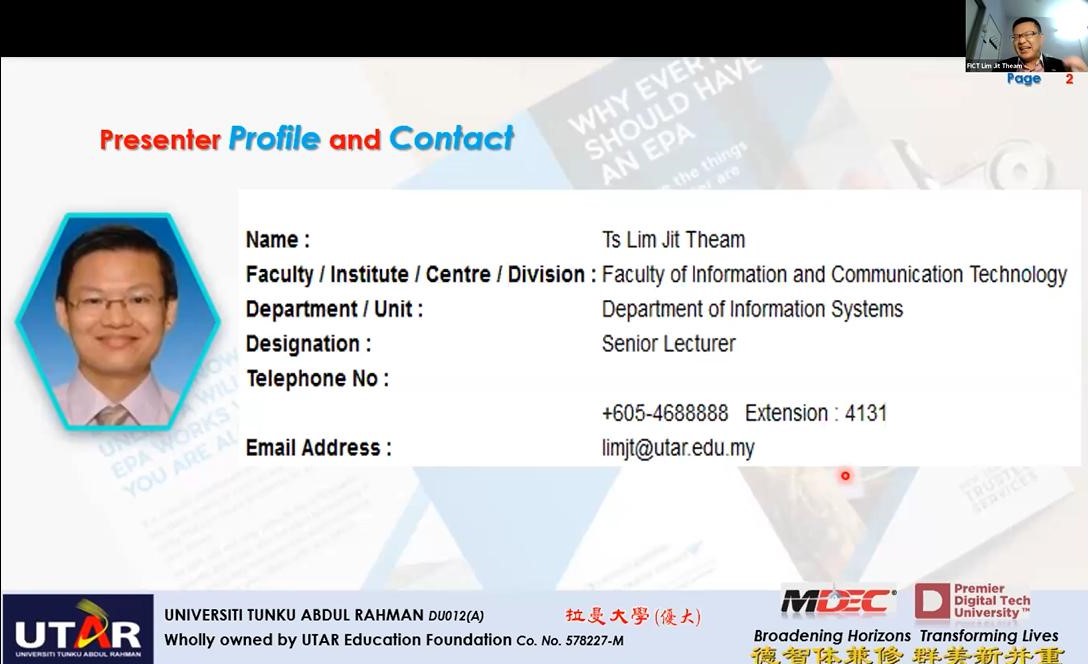
Ts Lim explaining the impact of Covid-19 on SME digitalisation in Malaysia
The participants were then enlightened by the second speaker Ts Lim on the topics called “Technology Solutions for E-Commerce”. In his talk, he explained, “Despite being the backbone of Malaysia’s business environment, SMEs perform relatively poorly in digitalisation. There exists a digital divide among businesses in Malaysia. As a solution, digitalisation is increasingly useful for small and medium enterprises to improve efficiency and competitiveness. Although the prevailing wisdom is that Covid-19 has ushered in a pivot to digitalisation, there remain many challenges that SMEs face in doing so. Government and policy interventions can facilitate this process, and we suggest some steps that can be taken to support SME digitalisation.” He also emphasised the strategies on how SMEs could use the collaboration opportunities with the industry in order for them to leverage more during the pandemic crisis. Ts Lim also touched on social media marketing and analytic in coping with businesses during the crisis.
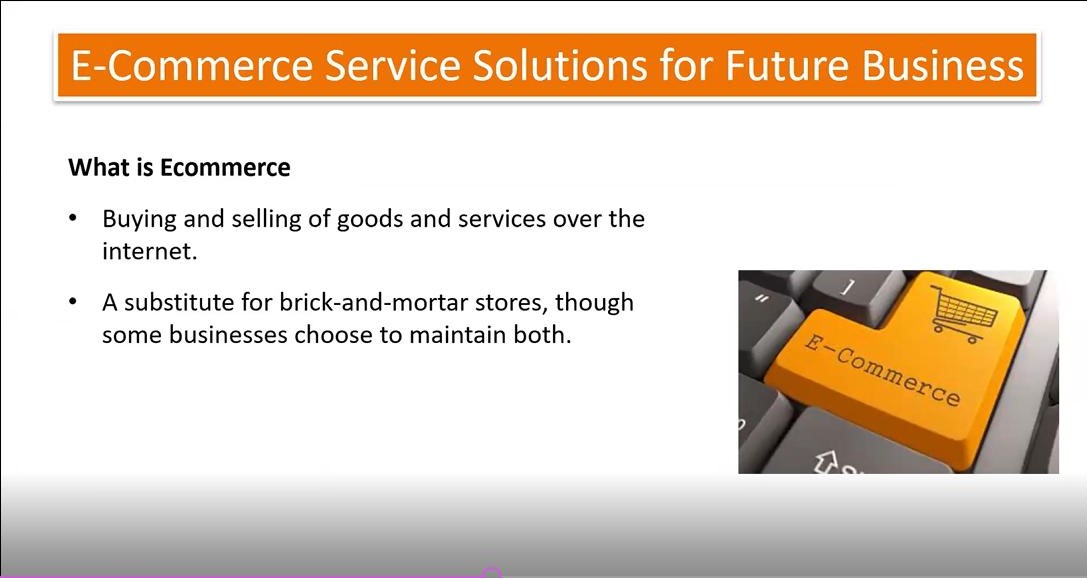
A dialogue by Chin on e-commerce service solutions for future business
Next on the agenda was a dialogue titled “E-commerce service solutions for future business” by Chin from FBF. As a start, she elucidated the participants with the definition of e-commerce. She said, “E-commerce is basically a process of buying and selling goods and services over the internet. It is also a substitute for brick-and-mortar stores, though some businesses choose to maintain both.” She then brought the participants to understand the limitations and benefits of e-commerce via her slides. She explained, “Among the limitations are limited customer service, lack of instant gratification and inability to touch the products. However, the benefits would be more where the sellers could market their products with enhanced convenience, personalisation and global marketplace with minimal expenses. In her session, she also said, as a retailer he or she must learn the future of e-commerce. They should have studied the emerging markets, physical versus online stores, B2B, private label, sustainable products and fulfilment centres. She also touched on the future of e-commerce for marketers.
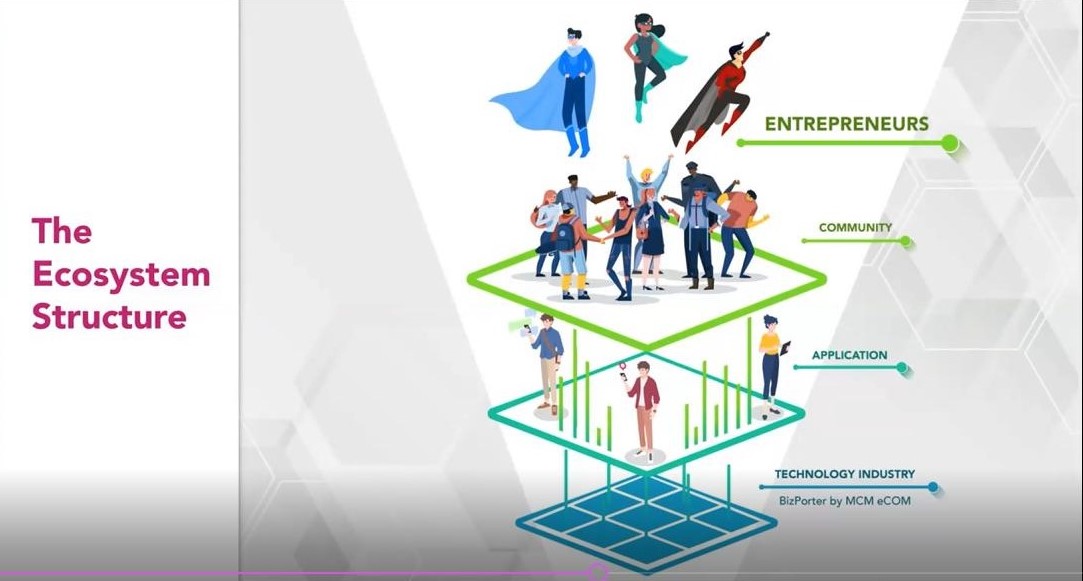
Dr Lee explaining how students can use the platform of UTAR Unovate Centre to engage in entrepreneurship
The fourth dialogue session was delivered by Dr Lee and he brought the participants to tour about UTAR’s own initiative to foster entrepreneurial spirit and culture among its students via the setup of UTAR’s E-commerce ecosystem called Unovate Centre. Dr Lee elucidated, “Unovate stands for “UTAR Innovation”. UTAR is probably one of the few private universities that now has a complete e-commerce ecosystem on campus that fulfils the process of sourcing the products, branding and marketing, labelling and storage, reaching out to consumers online, handling online payments, packaging and delivering the products to consumers; all completed on campus with the assistance of students to enable them to be trained and proficient in e-commerce. From theory in the classrooms to practice and real online business dealings, managing products and interacting with customers and consumers, UTAR students are fortunate to have this crucial experience that could be the start of future e-commerce ventures for them.”
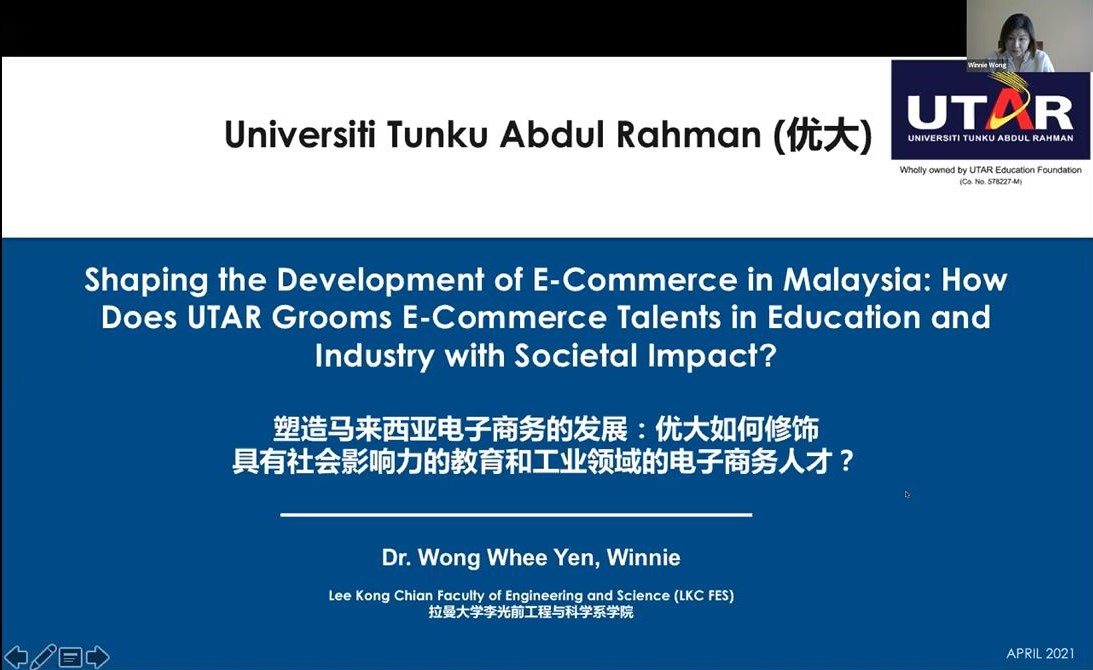
Dr Wong explaining how UTAR grooms e-commerce talents in education and industry with societal impact
The last dialogue was delivered by Dr Wong on the techniques to boost the business in the e-commerce world with UTAR. She said, “Back in 2016, UTAR was the first University outside China to sign a memorandum of understanding with Alibaba GET and under the GET programme, 30 UTAR lecturers from Kampar Campus and Sungai Long Campus attended the five-day training. Due to this, UTAR has also revamped its syllabus from theory to 100% coursework project based courses. UTAR emphasised on practical based courses for its students and staff. Via the connection from Alibaba, UTAR had multiple international collaborations with many potential retailers and marketers in various fields. Besides that, UTAR also works very closely with Socio Economic Research Centre Malaysia to find out the adoption level of e-commerce among the retailers and marketers.” Dr Wong’s talk also touched on UTAR’s development of e-commerce and entrepreneurship talents in education and industry with societal impact. Among the highlighted projects are UTAR’s course revision, mini entrepreneurship projects, UTAR business incubator centre/unovate centre, industry collaboration companies and associations, new village projects, consultancy services/training and industrial projects.
The forum came to an end with a closing remarks by Prof Faidz and an interactive Q&A session.
![]()
© 2021 UNIVERSITI TUNKU ABDUL RAHMAN DU012(A).
Wholly owned by UTAR Education Foundation (200201010564(578227-M)) LEGAL STATEMENT TERM OF USAGE PRIVACY NOTICE